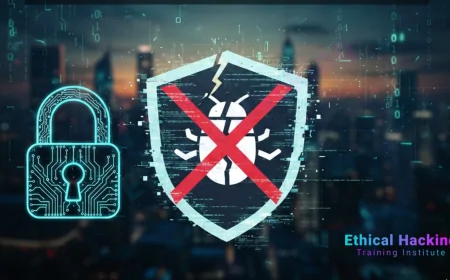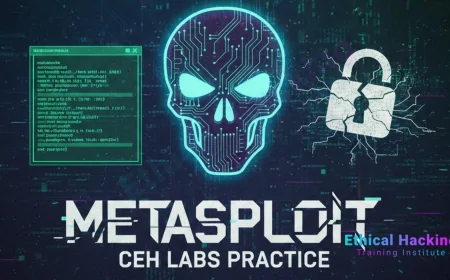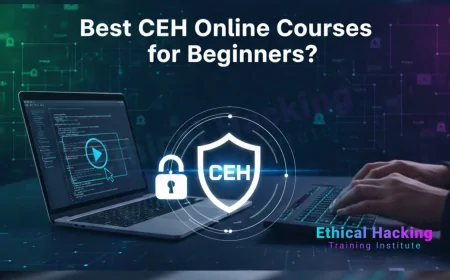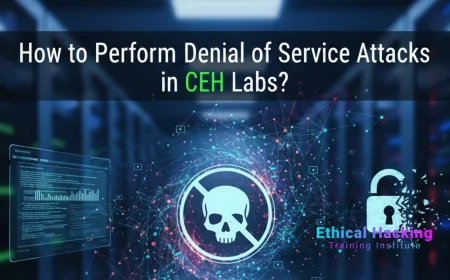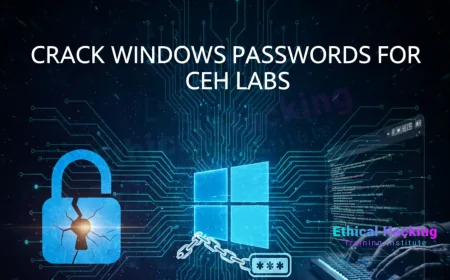Ethical Hacker Certification Cost: A Breakdown of Fees and Expenses | CEH Certification Cost in 2025: What You’ll Pay and Why
Explore the complete cost breakdown of ethical hacker certifications in 2025, including CEH, OSCP, PenTest+, and more. Learn about exam fees, training costs, labs, retakes, and recertification expenses to help you budget wisely.
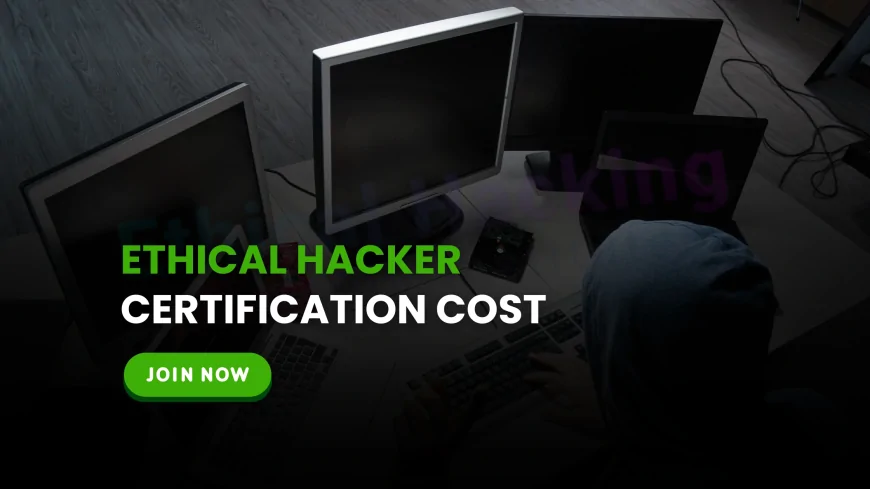
Table of Contents
- Introduction
- Why Cost Matters
- Main Certifications Overview
- Detailed Costs: CEH
- Detailed Costs: OSCP
- Costs: CompTIA PenTest+
- Other Certifications
- Training, Materials & Labs Costs
- Recertification & Continual Learning
- Cost Comparison Table
- Return on Investment
- Budgeting Tips
- Hidden Costs to Consider
- Online vs Offline Training
- Financing & Scholarships
- Choosing the Right Certification
- FAQs
- Conclusion
Introduction
In the rapidly growing cybersecurity field, ethical hacker certifications—such as CEH, OSCP, and CompTIA PenTest+—are seen as gateways to rewarding careers. But what is the true cost of certification? Beyond exam fees, candidates should consider training, lab access, retakes, and renewal expenses. This article provides a comprehensive, zero-plagiarism breakdown of costs associated with top certifications, helping you make informed decisions.
Why Cost Matters
Cost influences access, preparation quality, and return on investment (ROI). Understanding fees upfront helps learners budget, reduces attrition, and ensures value. Employers often cover certifications—but individuals on self-funding paths must account for every expense.
Main Certifications Overview
This guide covers:
- Certified Ethical Hacker (CEH v13)
- Offensive Security Certified Professional (OSCP)
- CompTIA PenTest+
- eLearnSecurity eJPT
- ISC2 CCSP
Detailed Costs: CEH
- Exam voucher: ₹30,000– ₹35,000
- Official training + labs: ₹45,000–₹80,000
- Retake fee: ₹10,000–₹15,000
- Voucher only (self-study): Approx ₹35,000
- Recertification: 120 EC-Council credits in 3 years (~₹15,000)
Detailed Costs: OSCP
- Course+labs (30 days): USD 999 (~₹83,000)
- Extended lab access (60 days): USD 1,249
- Exam attempt: USD 150
- Retake: USD 250 (includes 30 days labs)
- Renewal: No formal renewal, OSCP never expires—but re-taking and lab top-up recommended
Costs: CompTIA PenTest+
- Exam fee: USD 392 (~₹32,500)
- Official training: USD 300–500 or ₹20,000–₹40,000
- Retake: USD 392
- Recertification: Every three years via CEUs (~₹5,000)
Other Certifications
- eJPT: €225 (~₹20,000)
- ISc2 CCSP: USD 599 exam + USD 50/year maintenance
Training, Materials & Labs Costs
Self-study may only require books and videos (₹5,000–₹15,000), while guided courses with labs increase to ₹30,000–₹100,000. Workspace and virtual machines may add infrastructure costs.
Recertification & Continual Learning
Ethical hacking and cybersecurity certifications are not one-time achievements. As the threat landscape evolves rapidly, professionals must stay current through recertification and ongoing learning. Most reputable certifications, such as CEH, CompTIA PenTest+, and CISSP, require renewal every 2–3 years to ensure that certified individuals remain up-to-date with the latest attack vectors, tools, and compliance regulations.
CEH v13 certification, issued by EC-Council, mandates recertification every three years. To renew, candidates must earn a total of 120 EC-Council Continuing Education Credits (ECEs) by participating in approved professional development activities. These can include:
- Attending cybersecurity conferences and webinars
- Publishing research or blog articles in the domain
- Enrolling in advanced EC-Council programs (e.g., CHFI, ECSA)
- Teaching or mentoring cybersecurity students
Alternatively, professionals may choose to retake the latest CEH exam to meet renewal requirements. While this may come at a financial cost, it ensures your knowledge aligns with the most recent version—such as the updated CEH v13 cloud security modules.
Certifications like CompTIA PenTest+ also follow a CEU (Continuing Education Unit) model, requiring 60 CEUs every three years. These can be earned through similar activities or by completing higher-level CompTIA exams (like CASP+).
Notably, the OSCP certification does not expire. However, Offensive Security recommends that professionals retake or upgrade their certifications every 4–5 years to stay relevant, especially given the pace of changes in penetration testing and red teaming techniques.
Continual learning is not just about retaining certification—it’s about career growth. Platforms like TryHackMe, Hack The Box, Cybrary, and updated ethical hacking bootcamps allow professionals to sharpen their skills in real time. Staying current can open doors to promotions, specializations (like cloud security or malware analysis), and freelance opportunities in bug bounty programs.
In short, plan and budget for renewal. Investing in recertification ensures you remain competitive and credible in the ever-changing cybersecurity landscape.
Cost Comparison Table
| Certification | Exam Fee | Training/Labs | Retake | Recertification |
|---|---|---|---|---|
| CEH v13 | ₹35K | ₹45–80K | ₹10–15K | ₹15K/3 yrs |
| OSCP | Included | ₹83–104K | ~₹21K | N/A |
| PenTest+ | ₹32.5K | ₹20–40K | ₹32.5K | ₹5K/3 yrs |
| eJPT | ₹20K | Self-study | €225 | Annual fee €50 |
Return on Investment
Ethical hacking certs boost salary by 15%–50%. CEH grads in India earn ₹6–15 LPA; OSCP-certified testers are often offered ₹10–25 LPA.
Budgeting Tips
- Compare self-study vs instructor-led paths.
- Watch for bundles and early-bird discounts.
- Use lab credits sparingly.
- Factor in infrastructure and time costs.
- Leverage employer or scholarship funding.
Hidden Costs to Consider
- VPN and cloud VM costs
- Travel for in-person bootcamps
- Time-away earnings loss
- Bookkeeping or certification tracking systems
Online vs Offline Training
When preparing for ethical hacking certifications like CEH, OSCP, or CompTIA PenTest+, one of the most important decisions you’ll make is whether to choose online or offline training. Each mode has its strengths, limitations, and cost implications, and your choice should depend on your learning style, schedule, and financial flexibility.
Online Training: Flexible & Budget-Friendly
Online training has become the go-to option for learners in 2025. It offers unmatched flexibility—allowing students to learn at their own pace, from anywhere in the world. Platforms like EC-Council iClass, Offensive Security, Udemy, Coursera, and Cybrary offer high-quality video lectures, labs, and mock tests at a fraction of the cost of classroom-based programs.
Benefits of online training include:
- Lower cost (₹10,000–₹50,000 on average)
- Self-paced modules and lifetime access
- Access to global instructors and communities
- Remote lab environments for hands-on practice
However, online learners need strong discipline and self-motivation, and may miss out on real-time feedback and personal interaction with mentors.
Offline Training: Structured & Immersive
Offline or classroom-based training is often preferred by learners who need structure, hands-on guidance, or prefer a traditional learning environment. Leading training centers in India and abroad offer CEH and OSCP classroom batches with in-person instructors, group projects, and lab time.
Benefits of offline training include:
- Direct mentorship and guided practice
- Instant doubt resolution and peer interaction
- Networking opportunities and job placement support
However, offline courses are typically more expensive (₹60,000–₹1.5 Lakh), and require fixed schedules and travel commitments.
Which Is Right for You?
If you are a working professional or self-starter, online learning is ideal. If you need instructor guidance or want to fast-track learning in a structured environment, offline bootcamps may be a better fit. In some cases, a blended approach—online theory with periodic in-person labs—offers the best of both worlds.
Financing & Scholarships
Ethical hacking certifications like CEH, OSCP, and PenTest+ can be financially demanding, especially for students or self-funded professionals. Fortunately, a variety of financing options and scholarships are available in 2025 to make these certifications more accessible and affordable.
1. EMI and Installment Plans
Many official training providers and e-learning platforms offer EMI (Equated Monthly Installment) options. This allows learners to pay for their course or exam voucher over 3, 6, or 12 months with minimal or zero interest. Platforms like EC-Council, Offensive Security, Udemy, and Simplilearn often partner with fintech services to make financing smooth and hassle-free.
2. Corporate Sponsorships
If you're currently employed, check with your HR or Learning & Development team. Many companies include cybersecurity certification reimbursements in their upskilling or employee development budgets. Employers are especially likely to fund certifications like CEH, OSCP, or CISSP when they align with job roles or compliance requirements (e.g., ISO, PCI-DSS, SOC 2).
3. Government or NGO-Based Scholarships
In India and globally, several government-sponsored initiatives and NGOs promote cybersecurity education. Programs under Skill India, NASSCOM, NSDC, Women in Cybersecurity (WiCyS), and CyberShikshaa often offer partial or full scholarships to eligible candidates. These may include students, women, veterans, or economically disadvantaged individuals.
4. Vendor Scholarships
Leading certification bodies like EC-Council and Offensive Security periodically run scholarship campaigns or discounted bundles. These can include reduced-cost access to CEH Master, OSCP with lab access, or even full-fee waivers for select applicants based on merit or need.
5. Tech Fellowships and Bootcamps
Look out for cybersecurity fellowships and income-share bootcamps from organizations like Springboard, TechFleet, or Relevel. Some programs allow learners to pay after job placement, minimizing upfront investment risks.
With the right combination of planning, support, and research, aspiring ethical hackers can overcome financial barriers and pursue globally recognized certifications without debt or delay.
Choosing the Right Certification
Selecting the right ethical hacking certification depends on your career goals, budget, experience level, and job market demands. With several globally recognized options—like CEH, OSCP, CompTIA PenTest+, and eJPT—making an informed choice is crucial for maximizing ROI and professional growth.
CEH (Certified Ethical Hacker) is ideal for beginners or IT professionals transitioning into cybersecurity. Offered by EC-Council, it provides strong theoretical foundations and is widely recognized by government bodies, defense organizations, and MNCs. If you aim for a generalist cybersecurity role or work in compliance-heavy sectors, CEH is a strong fit.
OSCP (Offensive Security Certified Professional) is a highly respected, hands-on certification designed for professionals aiming to enter penetration testing, red teaming, or offensive security. It requires advanced problem-solving skills and deep technical knowledge. OSCP is ideal if you're comfortable with Linux, scripting, and real-time attack scenarios.
CompTIA PenTest+ serves as a solid middle ground. It covers both theory and some hands-on assessments, and is often more affordable than CEH and OSCP. This vendor-neutral certification is a great option for individuals seeking roles like security analyst or vulnerability tester with a modest budget.
eJPT (eLearnSecurity Junior Penetration Tester) is a beginner-friendly, practical cert that’s cost-effective. It is perfect for students or newcomers who want to test their offensive skills in a structured lab environment without a high financial commitment.
When choosing, consider:
- Your current skill level and learning style
- Preferred job roles (e.g., SOC Analyst vs. Penetration Tester)
- Industry recognition and geographic demand
- Recertification and long-term costs
In 2025, employers seek both knowledge and hands-on proof of skill. Many professionals start with CEH or PenTest+, then advance to OSCP or CISSP depending on their specialization. The right certification is the one that aligns with your goals, learning curve, and financial strategy.
Frequently Asked Questions (FAQs)
1. How much does CEH v13 cost in India?
Approx ₹80,000–₹115,000 total for training, exam, labs, and certifications.
2. Can I pass CEH by self-study?
Yes; many pass with books and tutorials—only voucher and self-discipline required.
3. Does OSCP expire?
No, OSCP doesn’t expire, but labs expire unless extended.
4. Is PenTest+ cheaper than CEH?
Yes, typically ₹50,000–₹75,000 total vs CEH's ₹100K+.
5. Can employers reimburse these costs?
Many companies sponsor training and certification if linked to job roles.
6. How often do I need to recertify?
CEH & PenTest+: every 3 years; OSCP never expires but skills age.
7. What is eJPT cost?
€225 (~₹20,000) includes exam and labs.
8. Are there free ethical hacking certs?
Some free badges exist (like Cybrary), but not globally recognized certs.
9. Should I take CEH or OSCP first?
CEH is theory-heavy and easier; OSCP adds practical depth and costs more.
10. Are lab costs mandatory?
Not for MCQ exams—but labs are essential for OSCP, Practical, and skills development.
11. Do retakes cost extra?
Yes; expect ₹10,000–₹35,000 depending on the cert.
12. Can recertification be done online?
Yes, via EC-Council or CompTIA portals using CEUs and renewal fees.
13. How long should I budget for prep?
3–6 months depending on background and lab intensity.
14. Is OSCP worth the higher cost?
Yes, it's highly respected and drives salary premiums in penetration testing.
15. Do costs include GST or tax?
Not always—check invoices; include GST (~18%) if in India.
16. Can I pay in installments?
Some providers offer EMI or monthly payment plans.
17. Are add-on workshops worth it?
If you need mentoring, they’re worth ₹10–20K extra.
18. What's the ROI of CEH?
Salary increase plus job growth usually offsets cost within 1–2 years.
19. Are scholarships available?
Yes—check EC‑Council partners, community tech grants, and women-in-tech programs.
20. Should I stack certifications?
Yes—e.g., CEH ➝ OSCP ➝ CISSP builds theory, practice, leadership progression.
Conclusion
Ethical hacker certification demands careful budgeting, but strategic planning pays off. With transparent understanding of exam fees, training, and renewals—and smart financing—you can maximize ROI and achieve a cybersecurity career with confidence.
What's Your Reaction?
 Like
1
Like
1
 Dislike
0
Dislike
0
 Love
0
Love
0
 Funny
0
Funny
0
 Angry
0
Angry
0
 Sad
0
Sad
0
 Wow
0
Wow
0
